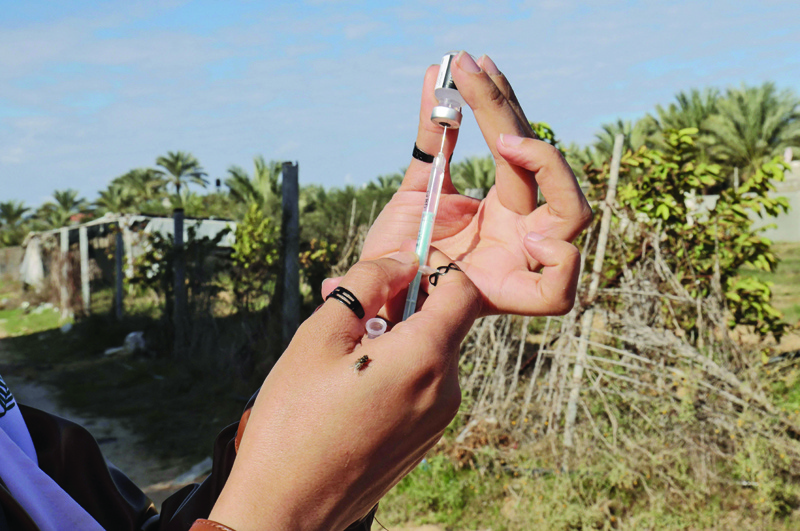 GAZA CITY: A Palestinian medic prepares a dose of the Pfizer/BioNTech COVID-19 vaccine during a campaign to encourage people to get vaccinated, in Gaza City yesterday. - AFP
GAZA CITY: A Palestinian medic prepares a dose of the Pfizer/BioNTech COVID-19 vaccine during a campaign to encourage people to get vaccinated, in Gaza City yesterday. - AFPGENEVA: The WHO has warned that the world was creating toxic conditions for new COVID-19 variants like Omicron to emerge and then spread around the globe. The World Health Organization said the combination of low vaccination coverage across the planet, mixed with very low testing to track the virus, was a fertile breeding ground.
The UN health agency stressed that measures to stop the globally-dominant Delta variant would also hinder Omicron. The new variant of concern has rattled countries around the world. "We need to use the tools we already have to prevent transmission and save lives from Delta. And if we do that, we will also prevent transmission and save lives from Omicron," WHO director general Tedros Adhanom Ghebreyesus told a press conference.
"But if countries and individuals don't do what they need to do to stop transmission of Delta, they won't stop Omicron either. "Globally, we have a toxic mix of low vaccine coverage, and very low testing-a recipe for breeding and amplifying variants. "That's why we continue to urge countries to... ensure equitable access to vaccines, tests and therapeutics all over the world."
Omicron in 23 countries
Omicron was first reported to the WHO from South Africa on November 24, while the first known laboratory-confirmed case was identified from a specimen collected on November 9. The Netherlands said Tuesday it had found the variant in two samples taken on November 19 and 23, one having recently been to southern Africa and the other having no travel history. Maria Van Kerkhove, the WHO's COVID-19 technical lead, said timelines around first detections of Omicron may change as there was a backlog of sequencing of cases that occurred in November.
Tedros said the WHO was taking the emergence of Omicron "extremely seriously", but added that the mutation "should not surprise us. This is what viruses do. "And it's what this virus will continue to do, as we long as we allow it to continue spreading." Tedros said Omicron was in at least 23 countries-with that number expected to grow. Van Kerkhove said the WHO was not yet aware of any deaths associated with Omicron.
Transmissibility studies
The WHO said it could take several weeks to complete studies of Omicron to see if there are any changes in transmissibility, severity or implications for COVID vaccines, tests and treatments. "We expect to have more information on transmission within days: not necessarily weeks, but in days," said Van Kerkhove. "The more this virus circulates, the more infections there will be.
The more infections there will be, the more people will die, and this is something that can be prevented." Several countries have imposed travel bans on flights from South Africa, which Van Kerkhove said was making it difficult to send samples from the country, even though they were willing to share them.
Van Kerkhove said: "We will get out of this pandemic but every day decisions need to be made on whether or not we're getting closer to the end of this pandemic or we're actually taking steps to prolong it." Michael Ryan, the WHO's emergencies director, said it was not the time for governments to be passing responsibility for management of the pandemic over to their citizens. "Certainly we are dealing with a crisis now: that crisis is in Europe, and it's being driven by the Delta variant," he said. - AFP










